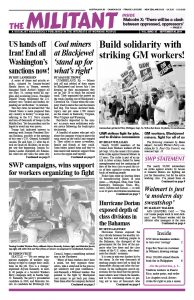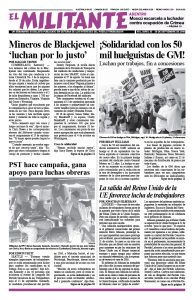Hurricane Dorian exposed the class divide between the wealthy ruling families and working people in the Bahamas, the disregard of the government for the lives of the majority who live there and the class values of the U.S. rulers, who dominate the islands’ economy.
It is seen in who was hardest hit by the storm. In the way thousands of working people were left to fend for themselves during and after the hurricane. In the inadequate search operations for the dead that the government admits won’t finish for months, and in the continuing chaos in getting aid to tens of thousands who desperately need it.
“Everybody’s been hit, the rich and the poor, but for the rich it’s less severe because they live in better buildings,” Jean Claude Timothy, 41, an electrician, told the press visiting the Great Abaco island’s Mudd neighborhood in Marsh Harbour, which was destroyed in the storm. “The people you work for for years don’t send a private plane for you … don’t give you any food, any vacation pay.”
Abaco and Grand Bahamas — the two hardest hit areas — are well-known for their resorts, marinas, luxury condos and golf courses. The wealthiest residents there abandoned the islands well ahead of time.
But those living in the poorer neighborhoods, including what the government calls shantytowns, mostly populated by Haitian immigrants and their descendants, were stuck, at best taking shelter in churches and schools, many of which collapsed during the storm.
The Washington Post reported Sept. 13 that Baker’s Bay Golf & Ocean Club on a small island not far from Great Abaco hired 16 private security guards equipped with helicopters and assault rifles to protect their property, including homes for the rich and famous.
While many roofs were damaged, Baker’s Bay homes survived the storm. Not so the Mudd shantytown across the water and nearby Pigeon Peas. The flimsy homes there, many which have never had running water or electricity, were leveled.
Eager that company bosses can get back to making a profit, Baker’s Bay Chief Executive Mike Meldman told the Post he’s considering docking a “mini-cruise ship” off the coast to get the resort back up and running. Some 2,000 mostly Haitian workers used to commute daily to Baker’s Bay by ferry.
Discrimination against Haitians
Whether or not the workers of Haitian descent will be able or allowed to rebuild is an open question. The Bahamian government has long fostered discrimination against Haitians to divide the working class and facilitate the bosses’ efforts to push down the wages and conditions of all working people.
The Bahamas-born children of Haitian immigrants are not automatically granted citizenship. Thousands of Haitians have been deported over the last several years.
The Bahamian government had been threatening to bulldoze the Abaco shantytowns, claiming they are illegal.
On Sept. 16, the Ministry of Housing and the Environment issued an order prohibiting anyone from rebuilding the shantytowns for at least six months on the pretext that it would interfere with removal of storm debris.
As of Sept. 17 the government has still refused to update the official death toll beyond the 51 reported a week ago. Everyone knows the figure is many times that. According to the government, there are still 1,300 people missing.
Some 7,000 people from Abaco and Grand Bahamas were evacuated to New Providence, the most developed of the islands, about 2,000 of them to shelters. At a shelter in Nassau, Timothy Rolle, one of the few Bahamians there, told the New York Times that Haitians and Bahamians are all being treated badly. He was so emphatic that a soldier warned the reporters who were interviewing Rolle that they were “inciting a riot.”
Everyone is worried about where they will live when they leave the shelters, and finding work. For those without official documents there is even greater uncertainty.
Immigration Minister Elsworth Johnson told the Times that the government has suspended deportation roundups in the areas damaged by the storm and the shelters. “Eventually persons will come out of those shelters,” he threatened, “and if they’re not properly documented, then we apply the law.”
Teachers who lost everything
“More than 200 of our members in Abaco and twice that in Grand Bahamas, lost their houses, their clothes, everything,” Belinda Wilson, president of the Bahamas Union of Teachers, told the Militant in a phone interview from Nassau Sept. 14.
“Our biggest concern is that they get housing and clothing,” she said, “and they need time to heal from the emotional trauma.”
School authorities have still not decided where to send as many as 10,000 students displaced by the hurricane.
U.S. imperialism overwhelmingly dominates the archipelago. U.S-based companies run many of the hotel and resort businesses there, which comprise more than 50% of the country’s gross domestic product. More than 80% of the Bahamas’ imports come from the U.S.
And despite some measures clamping down on “money laundering,” since 9/11 the Bahamas still serves as a haven for U.S. and other capitalists to set up businesses and avoid paying taxes.
Two weeks after the storm, the Bahamian government has still not even been able to organize the orderly arrival and distribution of donated aid. The three Bahamian airports had been so congested by uncoordinated flights from international aid and charity organizations that aviation authorities stopped all takeoffs for several hours Sept. 5.
Some food shipments have spoiled while waiting to be distributed.
U.S. government aid is being dispensed with an eyedropper. As of Sept. 14 it had approved a measly $10 million.
Many Bahamians would like to go to the United States, at least until more progress is made in restoring jobs and housing. But President Donald Trump has said that he will not extend temporary protected status to any of the country’s residents. The status would allow them to come to the U.S. and work temporarily.
The revolutionary government of Cuba is setting an example of what is needed to aid the people of the Bahamas. A group of 55 Cuban internationalist volunteers, who were in Bahamas prior to the storm as part of the Felix Varela Brigade, have been joining in the recovery efforts, including helping to repair damaged schools.
Cuba has offered to send experienced linemen to help rebuild the electric grid, volunteers with chain saws to clear roads, and doctors and nurses to provide medical care.

